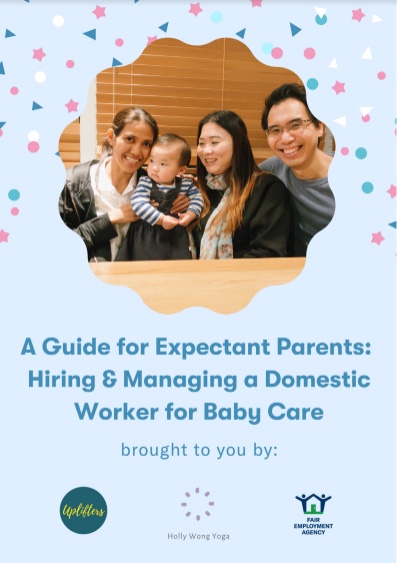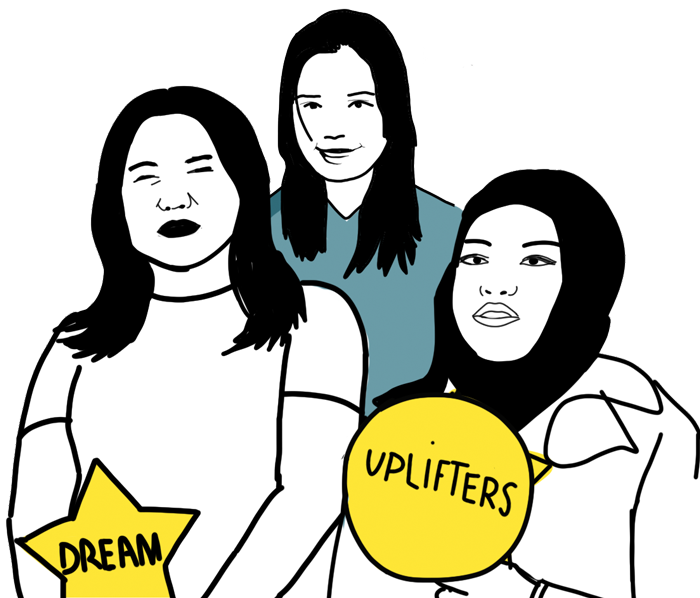Usual day off for a domestic worker
We all have seen a sea of domestic workers gathering in popular spots on Sundays at Victoria Park in Hong Kong or the Botanic Garden in Singapore. Normally we see them playing cards on cardboard boxes on footbridges or on the beach enjoying a BBQ as a community.
Occasionally we see them trekking the walking paths, exercising with friends, singing as a group, preparing for shows, or inventing and creating new styles of dancing. They have fun, they laugh, they look happy.
While I was working in a domestic workers’ recruitment agency in Hong Kong, I met many domestic workers who wished to change employers just because they did not have their day-off on a Sunday. They were missing meeting with their friends or families (for those lucky ones who have their relatives working in the same city) and consequently they would rather change employer to be able to see their loved ones on their day off.
My involvement as an employer
For years, I didn’t ask my domestic worker what she was doing on her day-off. I thought it was not really any of my business. After all, it is her life, her privacy. But as I became more and more aware of the well being of domestic workers and their life in general, I felt I had to ask her. I didn’t want to be intrusive but on the other hand, I didn’t want her to think that I didn’t care either.
When I watched the movie “The Helper Documentary” it struck me to see the impact that employers can have on the well-being of their domestic worker. The example of Liza Avelino is the most obvious one to me. She discovered a passion for hiking and eventually climbed Mount Everest, just because her employers suggested that she should do something more fulfilling during the weekend than sitting on a cardboard box and they encouraged her to join a hiking group.
Some amazing examples
There are many other examples of domestic workers who fulfil their passions thanks to the encouragement of their employers. Milkatus Sholikah, one of our Dare to Dream students, completed the 100 km Oxfam Trail-walker in November 2018 in Hong Kong. She is very thankful that her employers motivated her to participate and allowed her enough time to train. She had never participated in any race before! Read more about her achievement in the South China Morning Post.
Some are also interested in photography and several helpers have become famous like Xyza Cruz Bacani, who has been in exhibits worldwide. In Singapore, Ana Rohana, an Indonesian Domestic Worker and an amateur photographer was just featured in Channel News Asia.
As employers, we do have a responsibility for the well-being of our domestic workers. But how do we encourage them? They are all different and not all of them are like Liza, Milkatus, Xyza or Ana.
Jaybie , a domestic worker in Hong Kong whom I have interviewed recently, is passionate about sports and is sharing her experience with us:
“It is very hard and stressful for any domestic worker to be away from their families and kids… My suggestion is to get away from the stress, therefore I spend my day off attending sports events such as yoga, hiking, running and volunteering in race organisations to get a free race pass in return… I don’t want to waste my free time doing nothing.
We don’t need to be rich to be able to keep ourselves healthy while working. All we have to do is to find a way to balance our job as a domestic worker and our chosen activities.
MeetUp (worldwide) and Decathlon are promoting many different courses such as yoga, boot camp, Cross Fit, badminton, tennis, etc. It is free and you will find daily sports events in your location that you can join throughout the week. If I have spare time after work, I can join boot camp or Cross Fit classes. I am very lucky to have an understanding employer who likes the fact that I am interested in sports and supports me in this way. I sometimes wake up very early for a sunrise run or after I finish cooking, I escape for an evening jog.”
Her message for other domestic workers: “Don’t make excuses, sports provide a healthy balance in life and is a good way to release stress. Anything is possible if you maintain proficient communication and a good relationship with your employers, that’s the only key!”
How to encourage them?
The best thing is to engage a conversation with her:
- Just out of curiosity, what did you do yesterday? I hope you had a good time!
- Do you have a specific hobby that you enjoy doing on your day off? Or do you want/need to rest? Let me know if I can support you in your passion!
- Is there something in particular you would like to learn?
- We would be very happy to help you make the most of your day off.
All in all, it will be a great dialogue. She may not say much at first but it will start a positive habit in sharing about her day off.
You can suggest some activities like:
-
- Hiking
-
- Photography
-
- Yoga
-
- Relaxation meditation
- Free or cheap courses organized by NGOs
Activities you can find in Hong Kong and Singapore
Hong Kong
YMCA offers many different courses to domestic workers: baby care, elderly care, paediatric first aid/CPR, baking courses, bookkeeping, dressmaking, English courses, and so on.
TCK is a learning Center and a registered charity that offers low-cost classes, workshops and other activities for migrant workers.
Helperchoice is a hiring platform free of charge for domestic workers. It has created its own academy and provides a variety of courses from cooking and baking to financial management, English and Cantonese classes, sewing and more.
YWCA, Center of Learning and Life Enhancement. This centre offers First Aid/Child CPR, Self-Enhancement, Money Management, Kitchen Management and Cooking courses.
Splash Foundation offers domestic workers twelve weeks of beginner swimming courses in Hong Kong. Even though the course is free of charge, there are certain requirements to keep.
Enrich is a Hong Kong charity organisation promoting the economic empowerment of migrant domestic workers through financial and empowerment education. Their money management programs are taking place on Sundays.
EmpowerU is part of Hong Kong University. They started a program for domestic workers to study and learn new things from HKU professors and volunteers. They provide free lectures, training and workshops in Hong Kong on Sundays. It teaches domestic workers lessons on practical Health and Nutrition, Basic Rights and Women Empowerment, Nature Appreciation, Physical Fitness, Performance Arts, thus upgrading their knowledge and skills for their respective work environments, and in preparation for their homecoming.
Singapore
Home (Humanitarian Organization for Migration Economics). HOME’s Academy offers a wide range of workshops, such as English, computer literacy, cooking and baking, care-giving, dressmaking, cosmetology, and financial management.
FAST (Foreign Domestic Worker Association for Social Support and Training). They organise many courses: cooking, baking, pastry making, infant care, elderly care, foot reflexology, nursing care, computer skills, English, stress management, financial management and entrepreneurial skills.
Expat Kitchen not only teaches about cooking. It also teaches how to operate some kitchen appliances, manage and store food hygienically, quantify the ingredients properly, differentiate and select side dishes, salads and dressings to complement the main course, and so on. A cherry on the top of the course is, of course, hands-on workshop in preparing dishes from various cuisines.
Aquaducks up skills water safety knowledge and emergency procedures in theory and practice. It teaches basic but essential swimming skills and techniques.
Aidha is a Singapore based charity organisation. Aidha’s mission is to help foreign domestic workers and low-income Singaporean women to achieve economic independence through financial education, wealth creation, and entrepreneurship. Your domestic worker can be enrolled into monthly classes, such as money and tech management; planning a financial future; classes to start up their business, and certain classes to improve their English.
Worldwide
Uplifters (online education) is a non-profit organisation whose mission is to help migrant domestic workers through online education. Their free money management and personal growth program helps domestic workers become financially literate (budgeting, loan risks, savings, interest rate, investments etc.) and acquire personal growth tools (self-confidence, communication skills etc.). Through Uplifters your domestic worker has an opportunity to reach out to a Domestic Workers’ Group, which offers support whenever she might need it.
Ling Long Chinese is an online Mandarin course and are easy to follow with videos and exercises. The first level is free. The others are fee-based. Ling Long offered 50 of Uplifters team leaders a free scholarship and 10% discount to any potential student mentioning Uplifters!
Conclusion
I personally really like the fact that my domestic worker is active and enjoys her day-off by doing something fulfilling. Examples of domestic workers running, hiking, and learning new skills are inspiring and we can contribute by helping them achieve something wonderful. I feel it is a part of our role as an employer to guide them and support them.
And since domestic workers may have a bit more time off available in Hong Kong for 2019 (see article from the Asia Times), this topic could not come at a better time!
If you want to share an inspiring experience or show the impact a course had on your relationship with your helper, do not hesitate to write about it on our Facebook group for employers.



